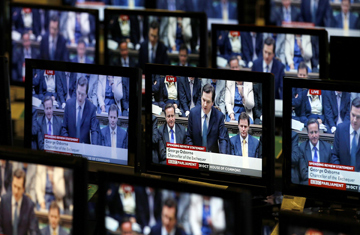
Britain's Chancellor of the Exchequer George Osborne is seen on television screens in an electrical store in Edinburgh, Scotland October 20, 2010
As Britain's Chancellor of the Exchequer George Osborne unveiled his savage austerity package in the House of Commons on Wednesday, it was hard not to think of "the English vice." That's what the French call being spanked for pleasure, a practice they imagine to be widespread among the British elite. And as the patrician Osborne reeled off details of each cut, freeze, efficiency saving and asset sale, to cheers from his Conservative colleagues and Liberal Democrat coalition partners, you could see how Britons got their reputation for masochism. Rarely has any new government so eagerly sacrificed popularity for certain, if potentially only short-term, electoral pain.
"Today's the day when Britain steps back from the brink," said Osborne, justifying the measures as a swishing corrective to his Labour predecessors' lax regimen. He maintained that the cuts — to be spread over four years — were guided by fairness, reform and growth. The U.K.'s £109 billion ($173 billion) structural deficit is the largest in Europe, Osborne averred, and the country is saddled with £43 billion a year ($68 billion) in debt interest charges. Labour, represented by newly appointed shadow Chancellor Alan Johnson, hit back. "If countries around the world hadn't run up debts [people] would have lost their jobs, they'd have lost their houses, they would have lost their savings," he said. Johnson accepted that cuts were necessary but questioned their depth and scope.
They are certainly deep and certainly far-reaching, proportionately the deepest and most far-reaching since World War II. Government departments will see budgets chopped by an average of 19%. Almost half a million jobs could be lost in the public sector as a result of the program; deep cuts to welfare are expected to deliver additional savings of £7 billion ($11 billion) on top of the £11 billion ($17 billion) already announced. "Those with the broadest shoulders" would "bear the greatest burden" of the savings drive, promised Osborne, proving the point by targeting even the Queen, with a one-year freeze to the budget for running the royal household and a reduction in spending of 14% the following year.
A further £5 billion ($8 billion) annually will be saved by the simple expedient of bringing forward gradual rises in the retirement age that will see British men and women expected to work until they're 66 from 2020. "Raising the state pension age is what many countries are now doing," said Osborne, blithely ignoring the reaction in other countries, not least France, where more modest proposals on pension reform have sparked escalating protests that seem close to bringing the Republic to a standstill.
Across the Channel, it's unclear how much pain Britons are prepared to tolerate. "If a policy isn't hurting, it isn't working" said John Major in 1989, at the time Margaret Thatcher's Chancellor, later her successor as Prime Minister. Within a few months, his compatriots were rioting in the streets in protest against an unpopular tax he'd introduced.
Reactions to Osborne's budget seemed to presage a similar response. "This is not a spending review — it's a massacre," snarled Derek Simpson, the general secretary of Unite, Britain's largest trades union. "It's totally perverse to claim that cutting half a million jobs and razing our public services to the ground is good for this country."
"Today is the day that an abstract debate about spreadsheets and numbers turns into stark reality for people's jobs and services," warned shadow Chancellor Johnson. But the eye-watering cuts will take time to feed through. In the meantime, Britons are braced for the impact. "It's ordinary people like me who are going to feel it, not the bankers, not the rich," sighs Ahmed, 23, a London Underground employee. Does he think industrial action is the answer? Not really, he says: "The bankers messed up but someone has to pay for the mess." The coalition is gambling that it can convince voters to submit to pain now in return for the heightened pleasure of economic recovery later. If the French are right about the British, that may not prove so difficult.
